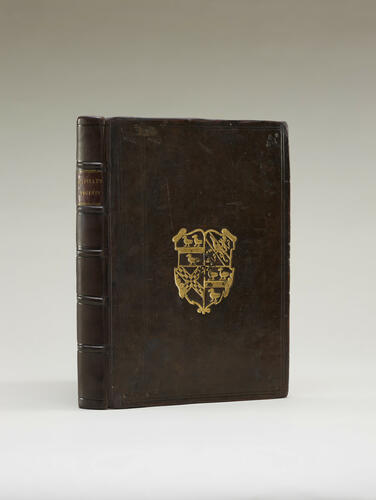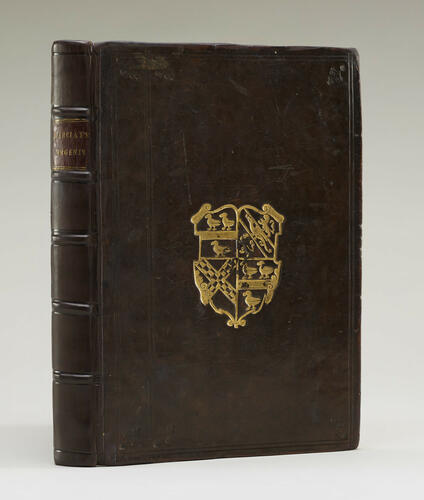-
1 of 253523 objects
Barclay his Argenis, or, the loves of Poliarchus and Argenis, faithfully translated out of Latine into English 1625
28.0 x 19.8 x 4.5 cm (book measurement (conservation)) | RCIN 1081177

John Barclay (1582-1621)
Barclay his Argenis, or, the loves of Poliarchus and Argenis, faithfully translated out of Latine into English / by Kingesmill Long, Gent 1625


-
Argenis is the major work of the Scottish author, poet and satirist John Barclay (1582–1621). Born in Lorraine to a French mother, Barclay claimed a proud Scots heritage through his father, although he spent his time between France, Italy, and England and may never have visited his patrilineal home. An ardent supporter of James VI & I, Barclay wrote several poems flattering the king and his court, for which he was rewarded with diplomatic duties and a pension of £200.
Argenis is Barclay’s second novel, a neo-Latin allegory of the French Wars of Religion told as the tale of a princess from ancient Sicily (the eponymous Argenis) and her three suitors—one good, one bad and one who is eventually revealed as her long-lost brother. First published at Paris shortly after Barclay’s death in 1621, it became an immediate sensation, such that James VI & I commissioned Ben Jonson to translate it into English, though no extant copy is known (the manuscript was among those destroyed when Jonson’s house caught fire in 1623). The first extant English edition—of which this Royal Library volume is a copy—was subsequently produced by Kingsmill Long in 1625.
This copy was acquired by Ralph Sheldon (1623–1684) and rebound in a contemporary English style with his armorial stamp. Sheldon was a notable collector of particularly books, manuscripts, coins and medals, as well as other antiquarian curiosities; his great-grandfather, also Ralph Sheldon (1537–1613), is best known for commissioning the great Sheldon tapestry maps, fragments of which are now the Bodleian Library and Victoria and Albert Museum.
Bibliographic description
Fol. in 4s. [6], 404 pages. Signatures: [A]4, B-Z4, Aa-Zz4, Aaa-Ddd4, Eee6.
Binding information
Mid-to-late seventeenth century English binding of brown leather (calf) over pasteboard; sewn on five supports; rebacked. On both covers, a central gilt armorial stamp of Ralph Sheldon (1623-1684); outer border of blind double fillets with a second vertical line approx. 1.5″ from the spine, with blind ornamental foliate stamps at the corners. Board edges tooled with a blind triangular-design roll. Spine with later label over red morocco (probably late eighteenth century). Original endpapers possibly retained during rebacking (crowned fleur-de-lys in shield type, initials ‘HG’); onlaid upper endpaper engraved with the Sheldon arms.
Included by Richard Rivington Holmes, Royal Libarian 1870–1905, in his Specimens of Royal, Fine and Historical Bookbinding (1893), no. 103.Provenance
Previously owned by Ralph Sheldon (1623-1684); his arms on covers and motto (‘In Posterum’) on third free endleaf. Sheldon family bookplate on upper pastedown (quartered with the arms of the Rudings, Heath, Grove, and Willington families into whom the Sheldons married); later signature of a ‘George Sheldon’ on title-page; presumably left the family in the Sheldon library sale of 1781. Nineteenth century armorial bookplate of Charles Lashmar (M.D., F.G.S.) on upper pastedown. Bears a bookplate of Queen Victoria and likely acquired during her reign.
-
Creator(s)
(translator)(publisher)Acquirer(s)
-
Measurements
28.0 x 19.8 x 4.5 cm (book measurement (conservation))
28.0 x 4.5 cm (book measurement (inventory))
Markings
annotation: "In Posterum" [motto of Ralph Sheldon] [third free flyleaf recto]
Category
Other number(s)
ESTC : English Short Title Catalogue Citation Number – ESTC S106944Alternative title(s)
Barclay his Argenis, or, the loves of Poliarchus and Argenis, faithfully translated out of Latine into English / by Kingesmill Long, Gent.
Place of Production
London [Greater London]